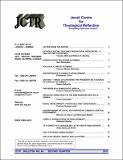JCTR Bulletin 2nd Quarter 2010

View/
Date
2010Author
Jesuit Centre for Theological Reflection
Type
BulletinLanguage
enItem Usage Stats
48
views
views
148
downloads
downloads
Abstract
The second quarter of 2010 in Zambia presented very interesting challenges in the governance
situation in Zambia. Three key situations presented themselves. First, the Draft Zambian Constitution
was released on 18 June 2010 to the general public for consideration and comment for a period of 40
days. Zambia’s Constitution making process has been going on since 2003 with the establishment of
the Mung’omba Constitution Review Commission. Though the Commission’s work was concluded in
December 2005, it was only in 2007 when the National Constitutional Conference (NCC) was
established to discuss the report and Mung’omba Draft. Since 2007, the NCC has with controversy
discussed Articles and Clauses and adopted some of the proposed Articles, rejected some and failed
to reach consensus on others. Second, the African Peer Review Mechanism (APRM) stagnated after
the national validation workshops took place in the first quarter. Though Zambia was supposed to be
peer reviewed in June (or July) 2010, nothing tangible happened in moving this process forward.
Third, Church-State relations continued to be crucial especially as regards Church involvement in
political, governance, and economic issues of the nation. The relations are further weakened by the
fact that when the Church highlights governance issues that are similar to issues raised by opposition
political parties, the Church is perceived and even accused to be partisan.
In addition to these highlighted issues, access to basic needs by a majority of Zambians continue
to be a problem as evidenced by both the JCTR Basic Needs Basket, and the JCTR Rural Basket.
Despite reduced national inflation rates by the Central Statistics Office (from 10.2% in March, to 7.8%
in June), food prices continued to relatively increase (for example, from ZMK2,771,930 in March 2010
to ZMK2, 799,280 in June 2010 for an average family of 6 in Lusaka).
